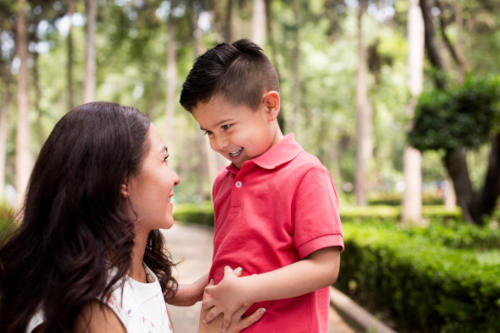
Many new adoptive parents feel uncertain and concerned about how to best discuss adoption with their child. What to share, when to share it, and how often to talk about adoption with their child can be overwhelming as they start these conversations.
To remove some of the pressure on new adoptive parents, I’ve compiled a quick list of what an adopted child should be aware of by the time they’re six. I don’t mean to over-simplify this topic, but I want to streamline the steps to managing the major subject of adoption. My goal is to give you six simple “tidbits” that you can work on by the time your child is six years old.
What Should Adopted Kids Know?
1. That they were adopted.
This conversation can begin simply by reading age-appropriate adoption books with and to your child. I recommend reading a wide variety of books about different adoptive families and asking questions that generate conversations. Then, consider creating a Lifebook for your child that tells his story in a visual, simple, and age-appropriate way.
2. Adoption is a normal way for families to form.
A child can be raised by parents who adopted them or by the parents who gave birth to them. Let your child know that both ways are beautiful ways to create a family.
There are some great books out there, like A Mama for Owen, The Mulberry Bird, and My Family is Forever, about the many ways families can be made. Reading children’s books is a great way to take the significance of a complicated story and tell it through a neutral third-party, such as a family of cute bears.
3. They were born to a mommy and daddy, just like all kids.
Since your child will wonder, make sure to be up-front and let them know that they didn’t just appear. He grew in his birth mother’s tummy. I suggest collecting a few children’s books to help you explain birth families to him, such as A Family for Baby Bear, Tell Me Again About the Night I Was Born, and Wonderful You: An Adoption Story.
4. Their birth parents didn’t place them for adoption because they were bad.
Adoption isn’t a choice that birth parents take lightly, so it’s definitely not a choice they make because of their child’s bad behavior. However, children tend to internalize messages that they are to blame when something hard happens. They may get the idea that something is wrong with them. You’ll need to remind her often that the choice to place her for adoption was about grown-up things, decided by grown-ups.
5. You care about and speak respectfully about their birth parents.
Even if you struggle to respect your child’s birth parents or their choices, your child must know you are committed to honoring and respecting their place in her life. This means they need to hear you speak well about them.
Children’s’ critical thinking skills are not developed enough to separate their birth parents from their choices or even from the child themselves. As a result, your child may internalize any criticism of their birth family as a critique of themselves.
6. The preparations for understanding their entire adoption story have been laid.
I recommend helping your child understand that his adoption story is his. Also, share that you will be there for him as he grows in understanding all that it involves.
There may be reasons that led to his adoption and parts of his adoption story that are too complex for a young child to understand. Adoptive parents must prepare for these parts of his story in these early years so you can expand with age-appropriate details as he grows.
If you’re feeling uncertain about how to begin this process, know that it’s normal. The thought is daunting to many new adoptive parents. However, it’s critical to tell your young child everything she needs to know as she grows. If you’re unsure how to start (who isn’t?!), check out our article, “How and When Do We Explain Adoption to Our Child?“, as well as our free adoption webinar “Talking About Adoption With Your Child.” In this exclusive Lifetime Adoption webinar, adoption experts answer some of the most commonly-asked questions about this subject.
Linda Rotz, CWCM-S, CWCM-Trainer, ACC, is the Director of Adoption Services at Lifetime. Linda has worked in the field of adoption for 20 years within the child welfare/foster care system in Florida. She has degrees in Mass Communications and Human Development, and completed graduate studies in social work.
Due to her extensive expertise, Linda was called upon to write adoption procedures and training materials in Florida. She is certified as an Adoption Specialist, Child Welfare Case Manager Supervisor and Child Welfare Trainer in the state of Florida.
